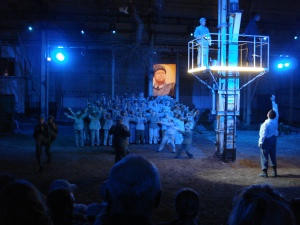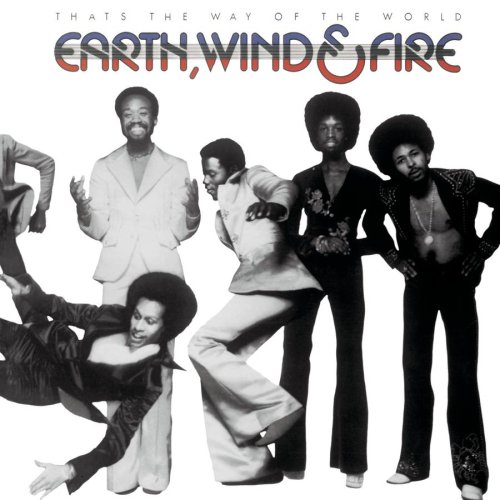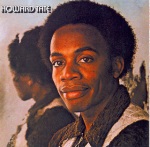This is a slightly longer version of the article that appeared in the Independent on 15 March 2012. I’ve been working with Birmingham Opera Company as a volunteer member of their chorus for their two most recent productions.
 In a disused tin-plate factory in a backstreet of Digbeth in Birmingham, an extraordinary thing is happening – a brand new, full-scale opera is being born. This can only mean one thing – world-renowned opera director Graham Vick is back in town, and his one-production-a-year Birmingham Opera Company has once again sprung into life.
In a disused tin-plate factory in a backstreet of Digbeth in Birmingham, an extraordinary thing is happening – a brand new, full-scale opera is being born. This can only mean one thing – world-renowned opera director Graham Vick is back in town, and his one-production-a-year Birmingham Opera Company has once again sprung into life.
Birmingham Opera Company has been staging groundbreaking opera in unusual locations around the city for more than a decade. It has never based a production in a traditional theatre, opting instead for large disused, or unlikely urban spaces; a shopping mall, empty factories, an abandoned ice rink and even a former city centre bank.
With the absence of conventional stage and seating areas in such venues, BOC have developed productions that cleverly blur the distinction between actors and audience. The audience is in the thick of it, herded and moved around as the action unfolds around them, and quite often becoming unwitting participants. Birmingham Opera Company’s audience gets to experience the full musical force of opera, up close and personal. They are engulfed by the sound of the orchestra, a huge chorus, and of course, the lead soloists. It’s better than a royal box.
In the spirit of Vick’s desire to experiment, break new ground and to never repeat, the company has commissioned an entirely new opera for this year. ‘Life is a Dream’ was written by composer Jonathan Dove and librettist Alasdair Middleton and is based upon a mythological tale by 17th Century Spanish playwright Calderón. The company has had less than three months to bring this new opera to life.
The surprising part about this most unusual of opera companies is that its chorus and cast of actors are ordinary members of the public who volunteer their services. Birmingham Opera Company actively encourages people from across the city, with little or no previous experience of either opera or performance, to join the cast.
In the hands of lesser people, this might be an entirely patronising endeavor, but this is no New Labour-style ‘social inclusion project’. Birmingham Opera Company’s productions are not designed to make opera ‘relevant’ to the experiences of inner-city youth or build the ‘self-esteem’ of people so often labeled ‘underprivileged’ or ‘vulnerable’. As one critic noted; ‘none of the works it has staged… has seemed an obvious choice for a company that involves as many local people as possible in every production’. Vick himself adds “if we were introducing audiences and participants to a new art form, then let it be to the art form at its most challenging and spiritually powerful.”
The reason an opera company consisting of so many novices can perform to such a high level is due to the BOC’s conviction that we are all, with a push, capable of raising our game. The amateur chorus and actors work long and hard in order to meet the standards Vick expects for his productions. Crucial in this mix is the support of professionals. Vick has assembled a team of actors, choreographers and musicians who train and work alongside the amateur cast.
Each section of the chorus, for example, has at least one ‘embedded’ professional, otherwise known by the dreaded term ‘mentor’. ‘Mentors’, usually newly graduated singers out to gain more experience themselves, are employed to offer guidance, support and hopefully some inspiration to the volunteer singers.
Then, of course, there are real stars of the show, the principal soloists. As well as using some of the best and most established singers around, Birmingham Opera Company offers much-needed opportunities to young talent with star potential. The two major roles in ‘Life is a Dream’ are played by respected lyric tenor Paul Nilon and sensational young American baritone, Eric Greene. The remainder of the cast also follows this same pattern of combining wisdom and experience with new talent. And, of course, all the soloists work and rehearse alongside the volunteer chorus and cast. There’s no place for big egos at Birmingham Opera Company.
To conclude, what Graham Vick and his company demonstrates so well is that opera, regardless of when, where and by whom it was made, can speak to us all and enrich our lives. When parochialism, ‘relevance’ and the politics of identity encourage us look inwards and backwards, the passion of Vick and his team to involve and teach the general public about opera, and his faith in their ability to understand and appreciate it, should be applauded and encouraged. The world premiere of ‘Life is a Dream’ is on 21 March at the Argyle Works in Birmingham.





 “It was his voice that grabbed you. Straight from the church—B.B. King and Sam Cooke rolled into one but more energized, with perfect phrasing and emotion to spare, capped by an amazing falsetto he called on at just the right moments.”
“It was his voice that grabbed you. Straight from the church—B.B. King and Sam Cooke rolled into one but more energized, with perfect phrasing and emotion to spare, capped by an amazing falsetto he called on at just the right moments.”
It takes a look at the lives and careers of long-overlooked veterans of the soul-music scene, including singers like Darlene Love, who worked with Phil Spector in the early 1960s, Merry Clayton, who backed the Rolling Stones for many years, as well as Lisa Fischer and Judith Hill, who are working as backing singers today. Many of them are big, colourful characters who make you wonder how they ever took a backseat role to anyone. Some of the subjects are also very modest, if extremely talented, and had or have little desire to be in the spotlight.
At the heart of the film is the question of failure and success. Why do some artists enjoy glittering careers and worldwide acclaim while others fade into the background? Why do some, in the case of Darlene Love, give it all up and find themselves cleaning houses? When you hear what some of these unsung singers are capable of, it’s clear that success is rarely a matter of who is the most talented.
Was it simply a case of bad luck for some singers? Did they simply not get the right breaks, or did they just lack something – the single-mindedness or pop star-sized ego required to make it? As Bruce Springsteen says at the beginning of the film ‘It’s a bit of a walk… that walk to the front is complicated…’. Or is the reason these singers never made it to the top to be found in the conservatism, and possibly even the racism, of the record industry?
Undoubtedly the record industry overlooked and ignored black performers. This was the case until the 1980s when Michael Jackson and Whitney Houston (whose mother Cissy was a backing singer for Elvis) changed the game. As one talking head in the film suggests, the attitude of record executives back then was ‘we’ve already got one Aretha, why do we need another?’. Darlene Love, whose story is at the centre of the film, has plenty she could be bitter about, though she’s never less than magnanimous when she recalls her experiences.